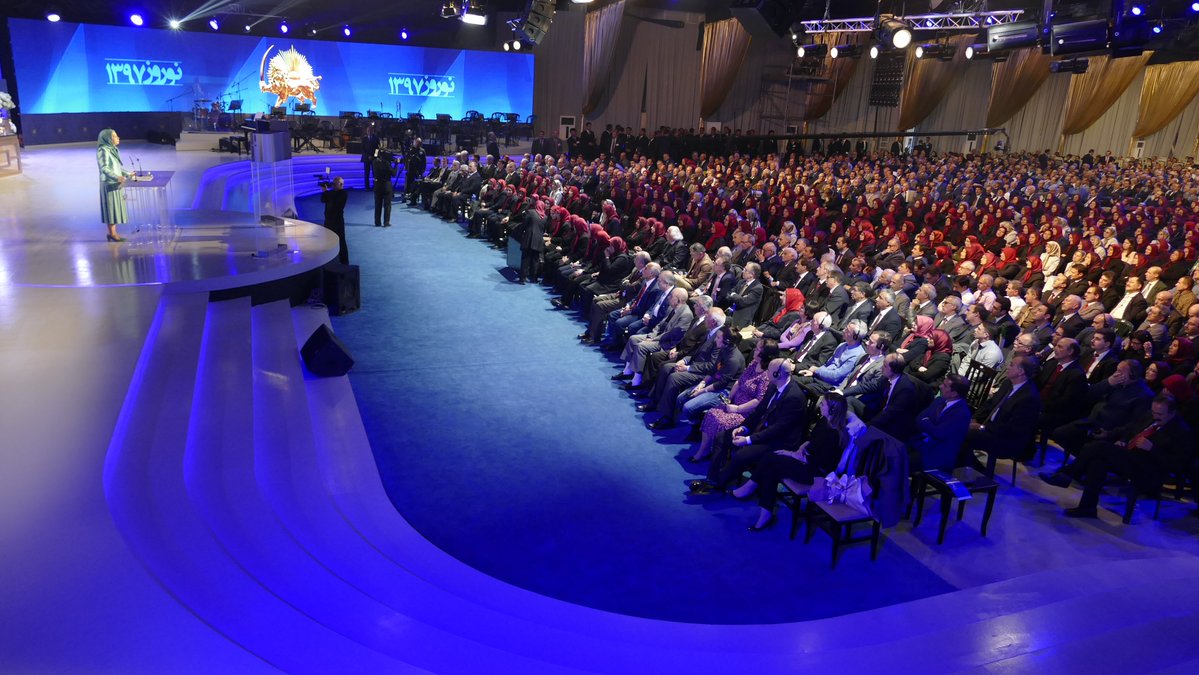At a time when Iran is experiencing unprecedented political, economic and social turmoil with protesters across the country demanding sweeping changes, the international scene is looking even more bleak for Tehran.
The Trump administration is undergoing a major reshuffling, with analysts believing Iran is becoming a significant focal point. The core understanding pivots around the mentality that there no longer remains any doubt that Iran poses the main threat to peace and security in the Middle East.
U.S. President Donald Trump nominated CIA Director Mike Pompeo as his top diplomat. Further reports indicate former U.S. ambassador to the U.N. John Bolton might become the new National Security Advisor to the President.
These developments follow a recent speech with Trump pinpointing Iran as being behind all the region’s ongoing dilemmas, analogous to the President’s annual statement marking the Persian holiday of Nowruz to lash out at Tehran and the Revolutionary Guards (IRGC) with unprecedented sharp-tongued language.
This is coming about as the clock ticks towards the May 12 deadline that President Trump has set for the final fate of the 2015 nuclear agreement with Iran. As this momentum builds up Tehran’s concerns, Rudy Giuliani, the acclaimed New York mayor during 9/11 and now Trump’s cybersecurity advisor, paid a visit to Albania, home to the Iranian opposition People’s Mojahedin Organization of Iran (PMOI/MEK).
The occasion was the Iranian New Year, “Nowruz,” meaning a new day, on Tuesday.
“America’s Mayor” on Sunday met with Iranian opposition leader Maryam Rajavi, President of the Paris-based National Council of Resistance of Iran (NCRI), the coalition best known for blowing the whistle on Iran’s clandestine nuclear program back in 2002.
And on Tuesday, Giuliani spoke before several thousand PMOI/MEK members, emphasizing how the MEK plays such a crucial role in ongoing protests.
Iranian Supreme Leader Ali Khamenei describes them as the main domestic element behind the unrest and President Hassan Rouhani called on his French counterpart to restrict the PMOI/MEK in France, Giuliani added.
“These and similar cases indicate the massive and growing social base of the MEK inside the country,” he continued.
He did not mince his words for the ayatollahs, saying they would end up in hell. And as far as Iran policy is concerned, he was quite unequivocal: The right policy on Iran is to seek a regime change.
Giuliani’s remarks in a way jibe with the President Trump’s Nowruz message:
“The history of Nowruz is rooted in Iran, where for millennia a proud nation has overcome great challenges by the strength of its culture and the resilience of its people. Today, the Iranian people face another challenge: rulers who serve themselves instead of serving the people.
“Twenty-five centuries ago, Darius the Great asked God to protect Iran from three dangers: hostile armies, drought, and falsehood. Today, the Iranian regime’s Islamic Revolutionary Guard Corps (IRGC) represents all three.
“Despite the oppression they face, Iranians are fighting to reclaim their rights. They long for a springtime of hope, and the United States stands with the Iranian people in their aspirations to connect to the wider world and have a responsible and accountable government that truly serves their nation’s interests.”
Giuliani comes with a history of tough language on Iran’s regime and supporting the cause of regime change. He has spoken proudly in the NCRI’s annual Paris gatherings along with hundreds of other dignitaries from across the globe and a large crowd of the Iranian Diaspora signaling the movement’s social base.
Pandeli Majko, Senior Minister of State and former Prime Minister of Albania; Elona Gjebrea, Secretary of the parliamentary Foreign Affairs Committee; and Fatmir Mediu, leader of the Republican Party of Albania and former Minister of Defense also took part and addressed the gathering.
Rajavi’s speech echoed an upbeat message.
“Last year ended with the season of uprising, and the coming year can and must be turned into a year full of uprisings. And this is going to be an uprising until victory,” she said.
“Khamenei had to admit that the force inciting protests in Iran is PMOI/MEK… and prepared for it since months before,” Rajavi continued.
“When the people of Iran have the option of a free and democratic government based on the separation of religion and state, and based on justice and equality, why should they have to be content with a reactionary, decadent and inhumane regime?”
As European officials remain concerned about their future interests, Rajavi pointed out, “Europe’s long-overdue focus on the threats posed by the Iranian regime’s regional warmongering and its ballistic missile program is of course a positive step. Further steps are needed, including the expulsion of the regime from the region, shutting down its missile and uranium enrichment programs, and blocking its access to the international banking system.”

There is no doubt of Iran being in the in the headlines in the months to come, already signaling a rapid shift in momentum against the ayatollahs.
That explains the heightening anxiety among senior regime officials to a point where on March 11, IRGC chief Mohammad Ali Jafari said that Khamenei’s main concerns includes the persistence of domestic unrest and the IRGC’s internal situation.
The new mood also renders from the Iranian opposition’s unprecedented optimism that the long-sought regime change by the Iranian people is very well within reach.
Nowruz is in fact heralding a truly new day for Iran.
As President Trump emphasizes in his Nowruz message, “May the Iranian people soon enjoy a new day of peace, prosperity and joy.”
Leave a Reply